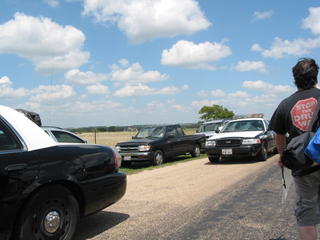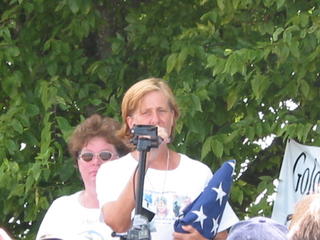Your Tax dollars at work

When FBI supervisors in Miami met with new interim U.S. Attorney Alex Acosta last month, they wondered what the top enforcement priority for Acosta and Attorney General Alberto Gonzales would be.
Would it be terrorism? Organized crime? Narcotics trafficking? Immigration? Or maybe public corruption?
The agents were stunned to learn that a top prosecutorial priority of Acosta and the Department of Justice was none of the above. Instead, Acosta told them, it's obscenity. Not pornography involving children, but pornographic material featuring consenting adults.
Acosta's stated goal of prosecuting distributors of adult porn has angered federal and local law enforcement officials, as well as prosecutors in his own office. They say there are far more important issues in a high-crime area like South Florida, which is an international hub at risk for terrorism, money laundering and other dangerous activities.
His own prosecutors have warned Acosta that prioritizing adult porn would reduce resources for prosecuting other crimes, including porn involving children. According to high-level sources who did not want to be identified, Acosta has assigned prosecutors porn cases over their objections.
Acosta, who told the Daily Business Review last month that prosecuting obscenity was a priority for Gonzales, did not return calls for comment.
"Compared to terrorism, public corruption and narcotics, [pornography] is no worse than dropping gum on the sidewalk," said Stephen Bronis, a partner at Zuckerman Spaeder in Miami and chair of the white-collar crime division of the American Bar Association. "With so many other problems in this area, this is absolutely ridiculous."
But not everyone agrees. With the rapid growth of Internet pornography, stamping out obscene material has become a major concern for the Bush administration's powerful Christian conservative supporters. The Mississippi-based American Family Association and other Christian conservative groups have pressured the Justice Department to take action against pornography. The family association has sent weekly letters to U.S. attorneys around the country to pressure them to pursue the makers and distributors of pornography.
"While there are crimes like drugs and public corruption in Miami, this is also a form of corruption and should be a priority," said Anthony Verdugo, director of the Christian Family Coalition in Miami. "Pornography is a poison and it's addictive. It's not a victimless crime. Women are the victims."
The federal government generally has not pursued pornography and obscenity for at least a decade. The Clinton administration declined to prosecute cases, and no book stores, video stores or Internet sites -- except those involving children engaging in sex -- were closed.
Former Attorney General John Ashcroft, a Christian conservative who stepped down last December, also disappointed social conservatives by not prosecuting porn during his tenure. In the wake of the Sept. 11 terrorist attacks, Ashcroft placed his focus on anti-terrorism efforts.
But the social conservatives have gained traction with new Attorney General Gonzales, a close associate of President Bush who is considered a strong contender for a U.S. Supreme Court nomination. In May, Gonzales established an Obscenity Prosecution Task Force under the office's criminal division.
The task force, headed by Deputy Chief for Obscenity Richard Green, will work closely with Bruce Taylor, senior counsel to the criminal division's assistant attorney general.
Taylor is one of the founding members of the Justice Department's National Obscenity Enforcement Unit back in the 1980s. He reportedly has prosecuted more than 100 state and federal obscenity cases and is the prosecutor who went after Hustler publisher Larry Flynt in the early 1980s. He won that case and Flynt spent six days in jail, but the case was overturned on appeal.
The task force, according to a Justice Department news release on May 5, will be "dedicated to the investigation and prosecution of the distributors of hard-core pornography that meets the test for obscenity, as defined by the United States Supreme Court."
In its 1973 landmark ruling on the subject, Miller v. California, the Supreme Court laid out a three-pronged test to separate obscenity from protected First Amendment speech. What the ruling said, essentially, was that if the material is offensive and prurient and has no artistic value, it is obscenity. The court left it up to local juries and communities to make the determination.
The Obscenity Prosecution Task Force will pull together prosecutors from sections covering organized crime and racketeering, asset forfeiture, money laundering, computer crime and intellectual property. They will be joined by prosecutors from the High-Tech Investigative Unit, which has computer and forensic experts. The focus will be on Internet crimes as well as on "peer-to-peer" distribution of pornography, according to the news release.
'WASTING OUR RESOURCES'
Acosta, a Miami native who formerly held a high-level position in the Justice Department, is having a hard time persuading other law enforcement officials in South Florida, including his own assistant U.S. attorneys, to join the anti-porn crusade.
Sources say Acosta was told by the FBI officials during last month's meeting that obscenity prosecution would have to be handled by the crimes against children unit. But that unit is already overworked and would have to take agents off cases of child endangerment to work on adult porn cases. Acosta replied that this was Attorney General Gonzales' mandate.
Acosta's meetings with other law enforcement agencies also were not particularly fruitful, sources said.
Criminal defense attorneys and an American Civil Liberties Union spokeswoman say they are appalled at the Justice Department's plan to prioritize the prosecution of obscenity when narcotics trafficking, public corruption, and fraud are rampant in South Florida.
Lida Rodriguez-Taseff, a spokeswoman for the American Civil Liberties Union and a partner at Duane Morris in Miami, said, "It's amazing that we're wasting our resources on the morality police instead of battling organized crime, illegal drugs, corruption and undocumented immigration. I can't even believe this."
Rodriguez-Taseff said she doubted that Acosta's anti-porn initiative would get off the ground, in part because it could end up discriminating by targeting South Florida's large gay community. "We are far too diverse a community for any such prosecution effort," she said.
Previous efforts by South Florida law enforcement to prosecute sexually explicit artists have fallen flat. Fort Lauderdale attorney Bruce Rogow successfully defended 2 Live Crew, the racy rap group that was charged with obscenity by former Broward Sheriff Nick Navarro in the 1990s.
"I'm not surprised that this is happening, because these things go in cycles and this is a conservative environment," Rogow said. "But I think law enforcement has lost its enthusiasm for these types of cases."
But not Sharp of the Family Association. He said any prosecutors who object to prosecuting obscenity don't understand the law. "Most attorneys have been led to believe that what is illegal is not illegal in terms of obscenity," Sharp said. "They have a misconception of what should be prosecuted. They think because it's consenting adults, it's not illegal."
Sharp said the initiative is necessary because local law enforcement and city attorneys get "crushed" by high-powered lawyers hired by adult book stores or video stores when there are efforts to shut those establishments down.
"You need the federal government to assist," said Sharp, who takes credit for closing six adult bookstores in his hometown in Mississippi.
But should porn be a priority in a place like Miami, where serious crime is rampant? "It's all part of the same thing, of the organized crime syndicate," Sharp said. "It has an effect on children."


















